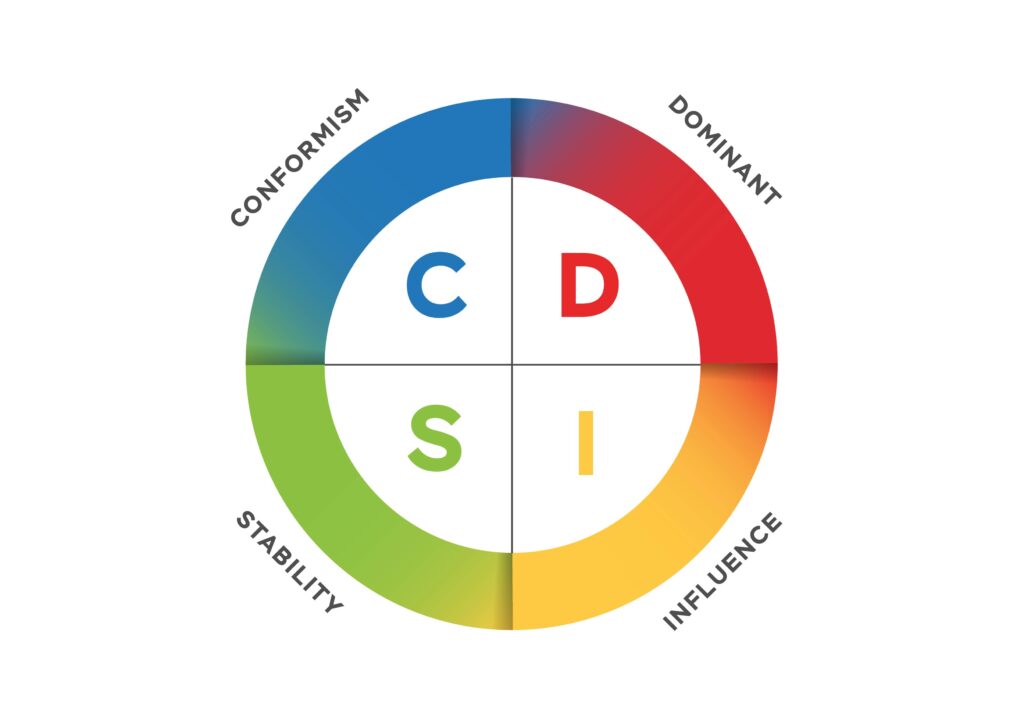It is often easier to lead a team than to lead yourself. Personal leadership is about leading yourself. That this is not always easy is clear. Being aware of your own behaviour is the start point. When you are aware of the strengths and weaknesses of your behaviour, you can then work on those aspects you would like to change. Of course, you as a person are unique and your situation is not always comparable to that of others.
A DISC-analysis helps you gain insight into your response behavioural style. This is the behaviour you show in your work environment. Your response behavioural style is also called your conscious, adjusted behaviour. In addition, the DISC analysis mainly provides insight into your preferred behaviour; your basic behavioural style. This is the behaviour you naturally deploy, without very consciously thinking about it. The basic style is also called your unconscious behavioural style. By understanding your preferred behavioural styles, you can work in a targeted way on those aspects of behaviour you would like to change. From the perspective of DISC, we can already give you some tips that each of the DISC styles can use to increase his or her personal effectiveness.

Dominance can increase effectiveness by:
- Being more patient and understanding of people who think and act slower
- Focusing not only on the goal, but also on the road towards it
- Not reacting primarily to others
- Taking less on board
- Making slightly lower expectations of others
- Reducing the pace so that others can keep up better
- Not taking the initiative for once, but leaving it to someone else
- Paying more attention to the people in the team
- Being more vulnerable and saying you don’t know the solution either
- Looking more closely at what is really important; not everything has to be finished today
- Finish what you started before starting a new project
- Put plans in writing, so they are not just in your head
Influence can increase effectiveness by:
- Include more time to complete things properly
- Structure your work (organisation)
- Do fewer things last minute
- Devising a good archive system and sticking to it
- Leaving earlier to be on time
- Be better prepared to participate in meetings
- Give things a fixed location so you don’t have to search for them unnecessarily
- Being in the background more often and letting someone else take the stage
- Being more critical and less quick to confide in people
- Taking a more objective stance more often
- Talking less about things and doing more by acting
- Thinking better before making commitments
Stability can increase effectiveness by:
- Saying no more often and protecting yourself better
- Realise that others would also like to know your opinion and give it to them
- Stand up for your interests more often; they are just as important
- Realise that you can only be really good to others if you are good to yourself
- To realise that the old is not necessarily better than the new
- To realise that by changing, new and better perspectives can emerge
- Ask others for feedback more often
- Take the initiative yourself more often and lean less on others
- Saying earlier what irritates you and not saving it up
- Complying with others less often when it does not suit you
- Get moving sooner and not wanting to maintain bad relationships
- Take more control yourself
Conformism can increase effectiveness by:
- Be less of a perfectionist and realise that good is also good enough
- Not feeling personally attacked by feedback
- Expressing your feelings more often now and then, so that others know how things are for you
- Take yourself less seriously
- Not to get bogged down in details and lose sight of the big picture
- Simply admit a mistake and solve it
- Be less suspicious of others who want to help you
- Set the bar less high
- Reaching a decision faster by sometimes gathering less information
- Realising that sometimes you have to take a risk to move forward
- Sharing your point of view earlier and not waiting to be asked for it
- Understanding others who may sometimes react emotionally
To increase effectiveness, it is also important to clarify qualities and pitfalls. This can be addressed by making use of the qualities and paying more attention to the pitfalls.
View the list of qualities and pitfalls per DISC style.